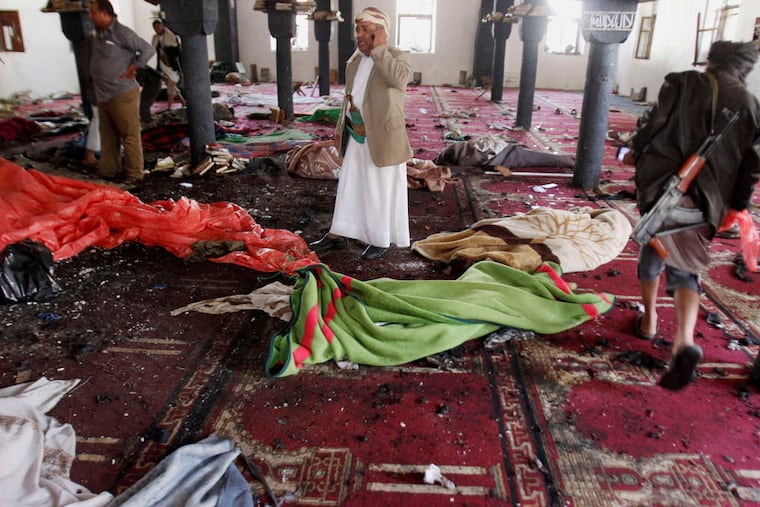Yemen attacks kill scores
Mosques linked to rebel Houthis were hit, the latest indication of a path to sectarian chaos.

SANA'A, Yemen - Suicide bombers attacked two mosques linked to Yemen's powerful Shiite rebels Friday, killing scores of worshipers and wounding hundreds in a further sign that the country is collapsing into sectarian chaos.
The attacks come a day after intense clashes in the southern city of Aden and an attempted assault on an oil-rich province by the rebels, known as Houthis.
An increasingly unstable Yemen poses security concerns for the United States, given that the country has been a staging ground for attacks by Yemen's branch of al-Qaeda against U.S. military and other Western targets.
The bombers targeted mosques used mainly by supporters of the Houthis, who have captured vast territory in a military assault that many Yemenis fear is turning the country into a proxy battleground for regional powers. Shiite Iran has boosted support for the Houthis, while Sunni Saudi Arabia backs their enemies.
Shortly after the attacks in the capital, Yemeni medical workers put the death toll at 46 and the number of wounded at 100. By late afternoon, a Houthi-run television network said there were 137 dead and nearly 350 wounded.
Among those killed was a Houthi spiritual leader, Murtadha al-Muhatwari, witnesses said. He was delivering a sermon at the Badr mosque when he and scores of worshipers were cut down by two suicide bombers, they said.
"There were two explosions that happened in the mosque: one in the front next to where I was sitting and another in the back. Both were carried out by suicide bombers," said Abdullah Abdulkarim al-Houthi, 50, a Houthi official who sustained shrapnel wounds in his arms and legs.
Hashem Abdullah, 28, was standing near the other mosque that was attacked, known as al-Hashoosh. He said a car bomb exploded next to the building just before a suicide bomber entered and detonated his explosives. The incident occurred shortly after the end of Friday prayers, when the mosque was teeming with people, he said.
"The explosion caused confusion among all the people, and soon after that a suicide bomber ran into the mosque and blew himself up near the area of the imam of the mosque," said Abdullah, referring to the prayer leader.
Abdullah said he spent part of the afternoon clearing away charred Qurans and clothing and loading trucks with the human carnage from the attacks at Hashoosh and the nearby Badr mosque, which was targeted at the same time.
After the attacks, Houthi militiamen fanned out across Juraf, the area where the bombings took place, blocking roads and inspecting civilians for weapons. Several Toyota pickup tricks with machine guns mounted on top blocked roads.
Footage aired by the Houthi television channel al-Masirah showed emergency responders frantically carrying bodies in blood-soaked sheets. The bodies were loaded onto pickup trucks while men in the background shouted in grief.
A group calling itself the Sanaa Province and claiming affiliation with Islamic State, also called ISIS and ISIL, claimed responsibility for the attacks. In a message transmitted via Twitter, it warned that the bombings were the "tip of the iceberg that is coming," according to a translation by the SITE Intelligence Group.
An Islamic State claim of responsibility was greeted with some skepticism among U.S. officials, who noted that the group is not known to have a significant presence in Yemen.